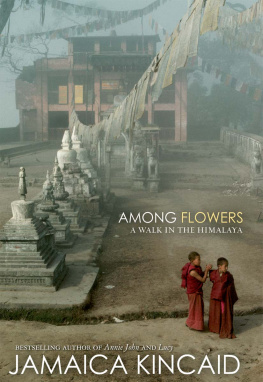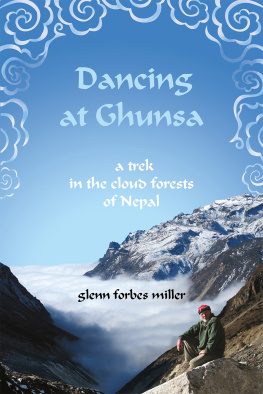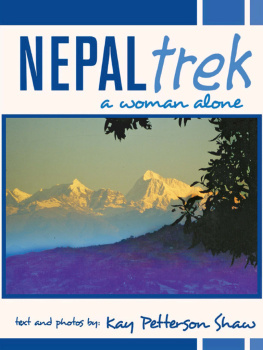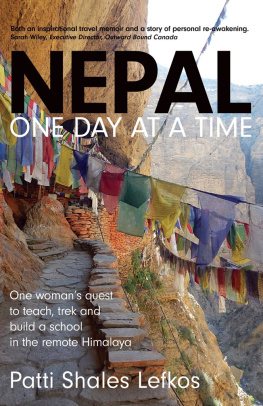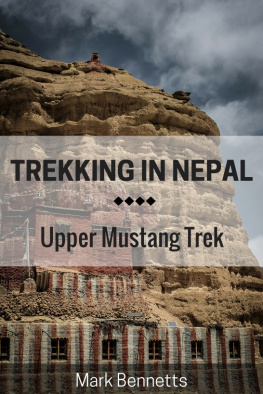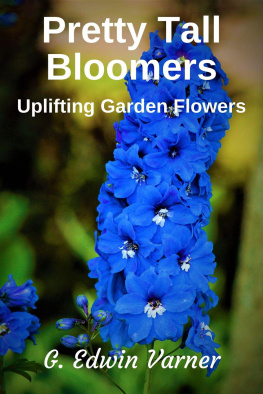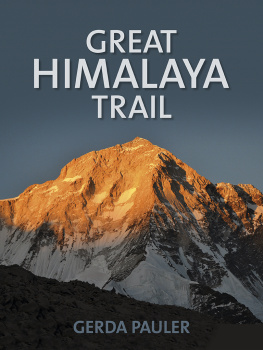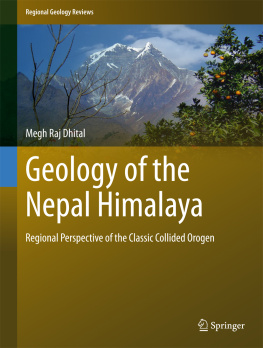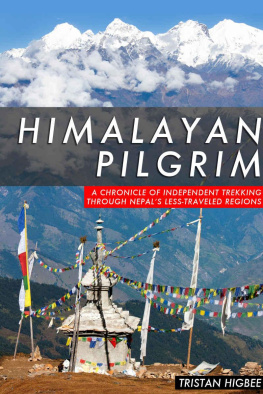Mr. Potter
AMONG FLOWERS
A W ALK IN THE H IMALAYA
J AMAICA K INCAID

For Jonathan Galassi
Published by the National Geographic Society
1145 17th Street, N.W., Washington, D.C. 20036-4688
Text copyright 2005 Jamaica Kincaid
Map copyright 2005 National Geographic Society
Photographs by Daniel J. Hinkley
All rights reserved. No part of this book may be reproduced or transmitted in any form or by any means, electronic or mechanical, including photocopying, without permission in writing from the National Geographic Society.
Library of Congress Cataloging-in-Publication Data
Kincaid, Jamaica
Among flowers: a walk in the Himalaya / Jamaica kincaid.
p. cm. -- (National Geographic directions)
ISBN: 978-1-4262-0901-7
1. Kincaid, Jamaica--Travel--Nepal. 2. Nepal--Description and travel. I. Title. II.
Series.
PR9275.A583K5632 2005
813.54--dc22
2004059284

One of the worlds largest nonprofit scientific and educational organizations, the National Geographic Society was founded in 1888 for the increase and diffusion of geographic knowledge. Fulfilling this mission, the Society educates and inspires millions every day through its magazines, books, television programs, videos, maps and atlases, research grants, the National Geographic Bee, teacher workshops, and innovative classroom materials. The Society is supported through membership dues, charitable gifts, and income from the sale of its educational products. This support is vital to National Geographics mission to increase global understanding and promote conservation of our planet through exploration, research, and education.
For more information, please call 1-800-NGS LINE (647-5463), write to the Society at the above address, or visit the Societys Web site at www.nationalgeographic.com.
CONTENTS

TO KATHMANDU
O ne day, in the year 2000, I was asked to write a book, a small one, about any place in the world I wished and doing something in that place I liked doing. I answered immediately that I would like to go hunting in southwestern China for seeds, which would eventually become flower-bearing shrubs and trees and herbaceous perennials in my garden. Two years before, in 1998, I had done this. I had accompanied the most outstanding American plantsman among his peers, my friend Daniel Hinkley, and some other plantsmen and botanists on a plant-hunting and seed-collecting adventure in Yunnan and Sichuan Provinces. I started out in the city of Kunming and it was so hotI wondered if I was just going to have a look at things I could grow in a garden that I made on the island in the Caribbean where I grew up. I wondered if the most thrilling moment I would remember was seeing the tropical version of Liriodendron tulipifera , the tulip tree, of William Bartrams travels. But then we went out in the countryside, and up into the mountains, up to fourteen thousand feet in altitude, Dan now reminds me, and I collected seeds of species of primulas, Iris , juniper, roses, paeony, Spiraea, Cotoneaster, Viburnum , some of which I have now growing in my garden.
I experienced many difficulties in this adventure, but they were of a luxurious kind. I did not like, and could not even bring myself to understand, my hosts relationship to food: I feel that the place in which it is taken in, eaten, be it the kitchen or the dining room, must be far removed from the place, bathroom or outhouse, in which it comes out again in the form of that thing called excrement. Not once was my life really in danger, not even when I was close by to places where the Yangtze River was in the process of flooding over its banks just at the moment I was driving by its banks in my rather nice, comfortable bus. The greatest difficulty I experienced was that I often could not remember who I was and what I was about in my life when I was not there in southwestern China. I suppose I felt that thing called alienated, but it was so pleasant, so interesting, so dreamily irritating to be so far away from everything I had known.
And so when I was asked to do something I liked doing, anywhere in the world, my experience in southwestern China immediately came to mind. I called up Dan Hinkley and I said to him, Lets go to China again. As a plantsman and botanist, and nurseryman to boot, Dan goes to some faraway place and collects the seeds of plants once or twice a year. The intellectual curiosity of the plantsman and botanist needs it, and the commercial enterprise of the nurseryman needs it also. When I suggested southwestern China to him as a place of adventurous plant-collecting, he said, Oh, why dont we do something really exciting, why dont we go to Nepal on a trek and look for some Meconopsis ? Why dont we do something really interesting, he said.
In October 1995, Dan had traveled to Nepal on his first seed-collecting expedition there. He had collected in the Milke Danda forest, a forest that is in the Jaljale Himal region. Milke Danda, Jaljale Himal! To see those words on a page, flowing from my pen now, is very pleasing to me. In 1998 when I accompanied Dan and some other plants-people to southwestern China, I had no idea that places in the world could provide for me this particular kind of pleasure; that just to say the name of a place, to say softly the name of a place, could cause me to long deeply to be in that place again, or to long just to be nearby again. That first visit he made to Nepal haunted Dan so that he wanted to go there again. Its quite possible that I could hear his longing and the haunting in his voice when he suggested to me that we go looking for seeds in the Himalaya, but I cannot remember it now. And so Nepal it was.
We were all set to go in October 2001. Starting in the spring of that year, I began to run almost every day because Dan had said that the trip would be arduous, that I had no idea how hard it would be, and that I must prepare my body for the taxing physical test to which I would subject it. And so I ran for miles and miles, and then I lifted weights in a way designed to strengthen the muscles in my legs. It was recommended to me that I walk with a backpack full of stones, so that I might make my upper body more strong. I did that. And Dan had said that I needed a new pair of boots and that I should break them in, and so I wore them all the time, in the garden, to the store, or even to a dinner outing. Everything was going along well, until near the end of August: I suddenly remembered that my passport with a visa stamped in it from the Royal Nepalese Consulate General in New York had not come back from my travel agent. I called to tell her that she ought to hurry them up because I applied for my visa in June and here it was August, and still I had not heard if I would be allowed to enter that country in a month. She was very surprised to hear from me, she had not received my passport in June, she had forgotten all about me. In any case where was my passport? We could trace its arrival in her office on Park Avenue, but it never reached her desk. It has been lost, she said; it has been stolen by someone in her office, I thought.

